外研版2019必修第一册Unit 5 Into the wild Using language-课件30张
文档属性
| 名称 | 外研版2019必修第一册Unit 5 Into the wild Using language-课件30张 |
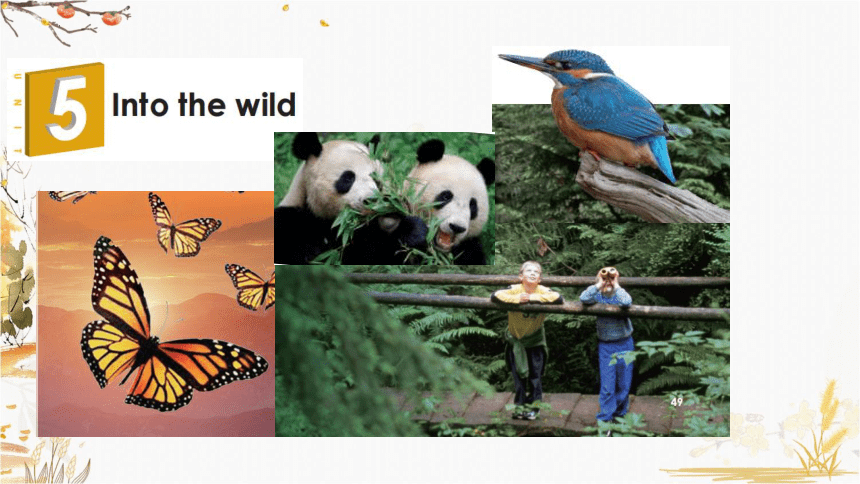
|
|
| 格式 | pptx | ||
| 文件大小 | 2.7MB | ||
| 资源类型 | 教案 | ||
| 版本资源 | 外研版(2019) | ||
| 科目 | 英语 | ||
| 更新时间 | 2022-11-07 00:00:00 | ||
图片预览

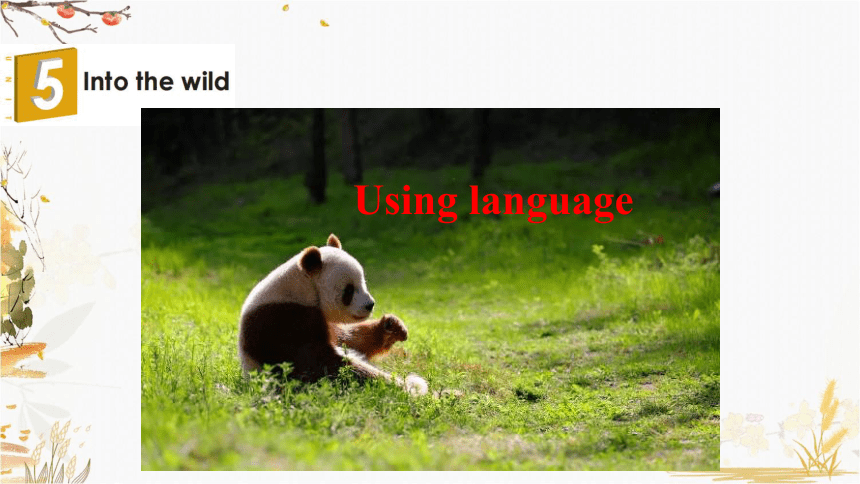
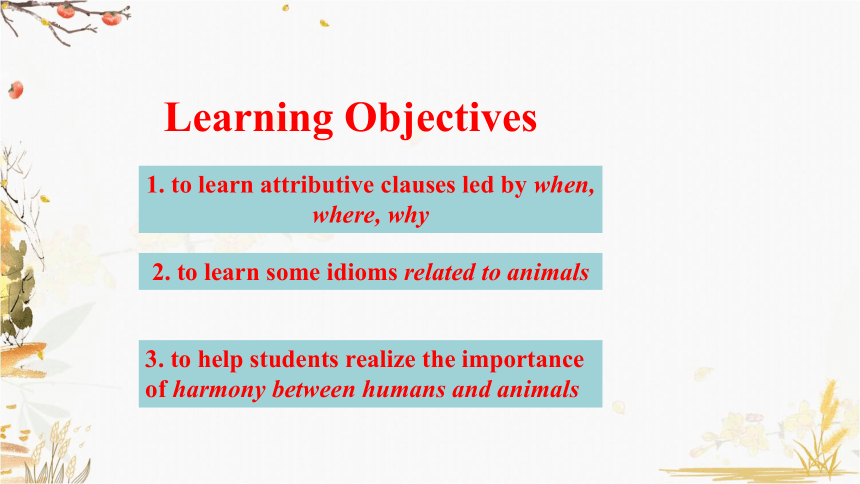
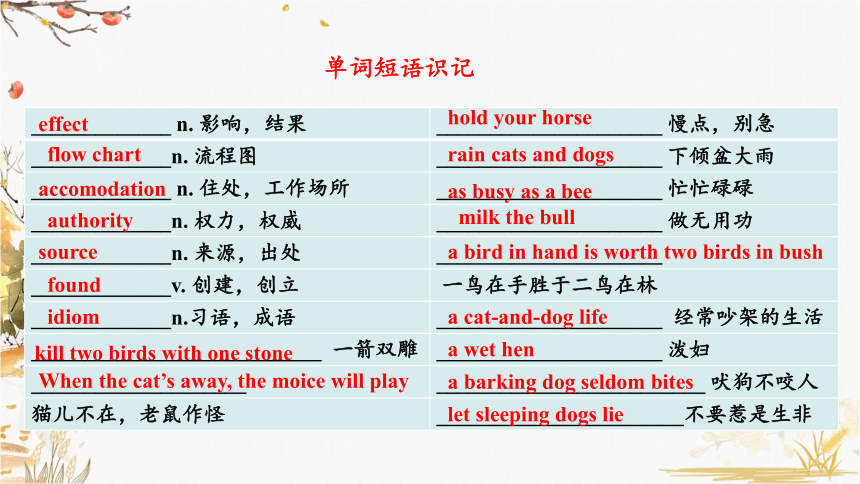
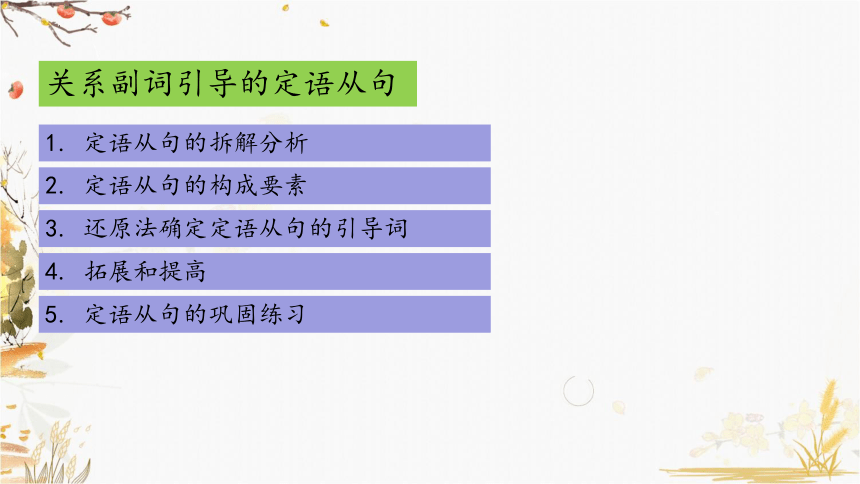
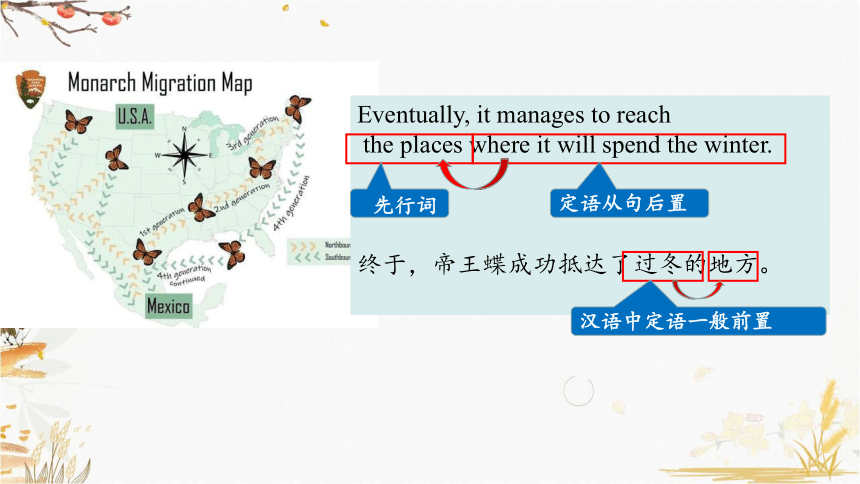
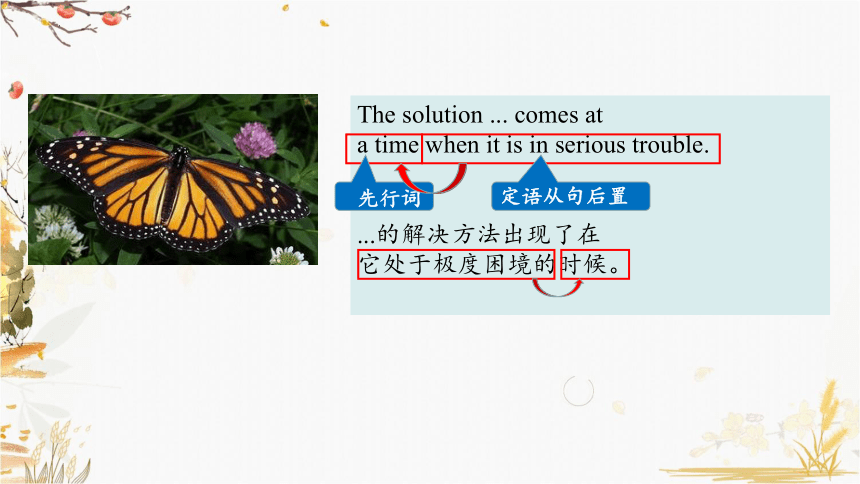
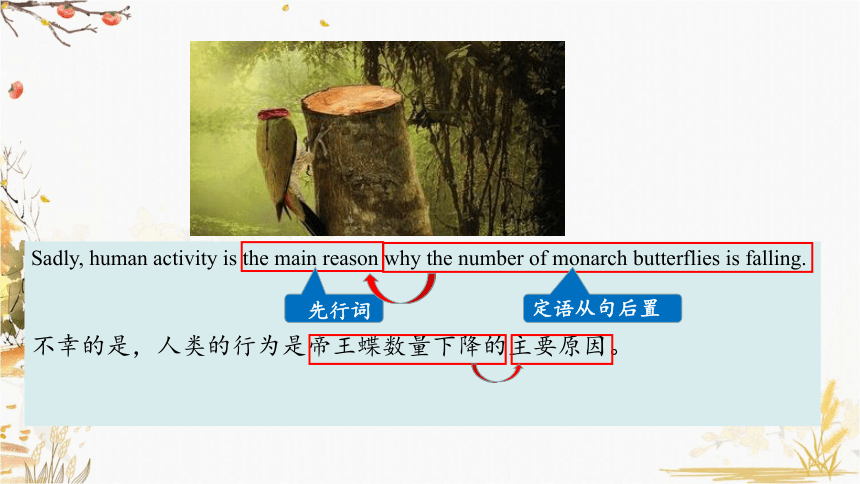
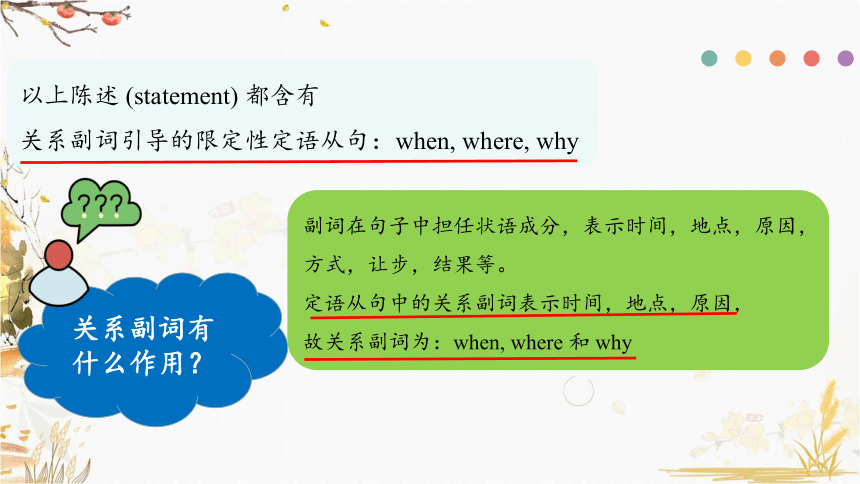
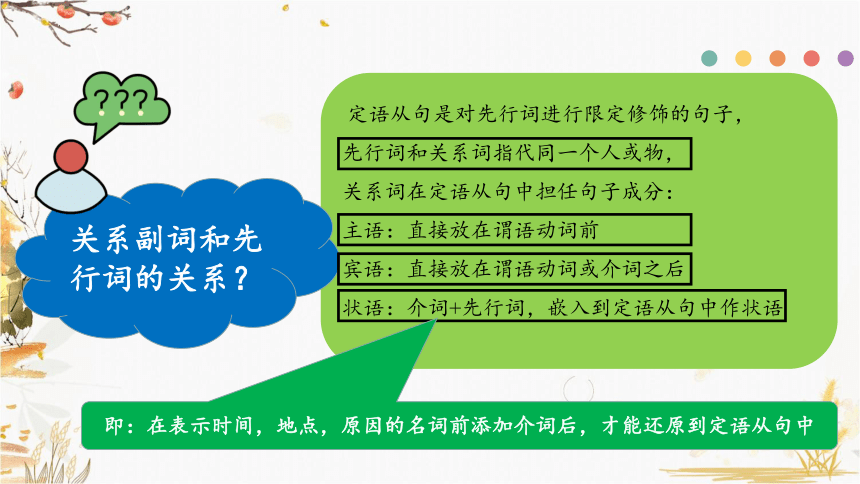
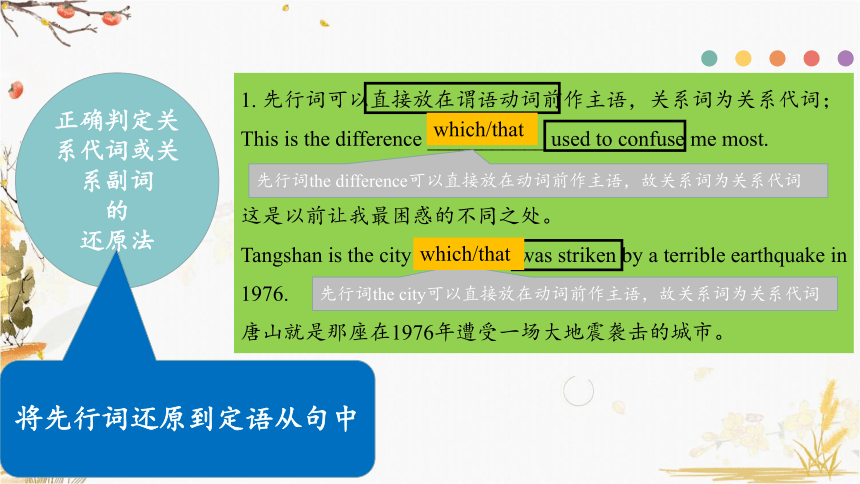
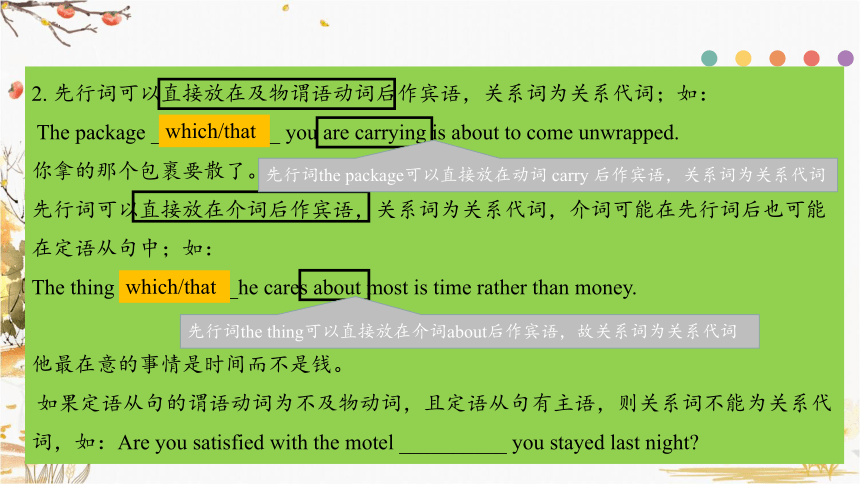
文档简介
(共30张PPT)
Using language
1. to learn attributive clauses led by when, where, why
2. to learn some idioms related to animals
3. to help students realize the importance of harmony between humans and animals
Learning Objectives
单词短语识记
_____________ n. 影响,结果 _____________________ 慢点,别急
_____________n. 流程图 _____________________ 下倾盆大雨
_____________ n. 住处,工作场所 _____________________ 忙忙碌碌
_____________n. 权力,权威 _____________________ 做无用功
_____________n. 来源,出处 _____________________
_____________v. 创建,创立 一鸟在手胜于二鸟在林
_____________n.习语,成语 _____________________ 经常吵架的生活
___________________________ 一箭双雕 _____________________ 泼妇
____________________ _________________________ 吠狗不咬人
猫儿不在,老鼠作怪 _______________________不要惹是生非
effect
flow chart
accomodation
source
authority
found
idiom
kill two birds with one stone
When the cat’s away, the moice will play
hold your horse
rain cats and dogs
as busy as a bee
milk the bull
a bird in hand is worth two birds in bush
a cat-and-dog life
a wet hen
a barking dog seldom bites
let sleeping dogs lie
关系副词引导的定语从句
1. 定语从句的拆解分析
2. 定语从句的构成要素
3. 还原法确定定语从句的引导词
4. 拓展和提高
5. 定语从句的巩固练习
Eventually, it manages to reach
the places where it will spend the winter.
终于,帝王蝶成功抵达了过冬的地方。
先行词
定语从句后置
汉语中定语一般前置
The solution ... comes at
a time when it is in serious trouble.
...的解决方法出现了在
它处于极度困境的时候。
先行词
定语从句后置
Sadly, human activity is the main reason why the number of monarch butterflies is falling.
不幸的是,人类的行为是帝王蝶数量下降的主要原因。
先行词
定语从句后置
以上陈述 (statement) 都含有
关系副词引导的限定性定语从句:when, where, why
关系副词有什么作用?
副词在句子中担任状语成分,表示时间,地点,原因,方式,让步,结果等。
定语从句中的关系副词表示时间,地点,原因,
故关系副词为:when, where 和 why
定语从句是对先行词进行限定修饰的句子,
先行词和关系词指代同一个人或物,
关系词在定语从句中担任句子成分:
主语:直接放在谓语动词前
宾语:直接放在谓语动词或介词之后
状语:介词+先行词,嵌入到定语从句中作状语
关系副词和先行词的关系?
即:在表示时间,地点,原因的名词前添加介词后,才能还原到定语从句中
正确判定关系代词或关系副词
的
还原法
将先行词还原到定语从句中
1. 先行词可以直接放在谓语动词前作主语,关系词为关系代词;
This is the difference ___________ used to confuse me most.
这是以前让我最困惑的不同之处。
Tangshan is the city _________ was striken by a terrible earthquake in 1976.
唐山就是那座在1976年遭受一场大地震袭击的城市。
先行词the difference可以直接放在动词前作主语,故关系词为关系代词
which/that
先行词the city可以直接放在动词前作主语,故关系词为关系代词
which/that
2. 先行词可以直接放在及物谓语动词后作宾语,关系词为关系代词;如:
The package ____________ you are carrying is about to come unwrapped.
你拿的那个包裹要散了。
先行词可以直接放在介词后作宾语,关系词为关系代词,介词可能在先行词后也可能在定语从句中;如:
The thing ___________he cares about most is time rather than money.
他最在意的事情是时间而不是钱。
如果定语从句的谓语动词为不及物动词,且定语从句有主语,则关系词不能为关系代词,如:Are you satisfied with the motel __________ you stayed last night
先行词the package可以直接放在动词 carry 后作宾语,关系词为关系代词
which/that
先行词the thing可以直接放在介词about后作宾语,故关系词为关系代词
which/that
如果定语从句的谓语动词为不及物动词,且定语从句有主语,则关系词不能为关系代词,如:
Are you satisfied with the motel ___________________________ you stayed last night
你对昨天入住的汽车旅馆感到满意吗?
He is preparing for the meeting __________________________ he will speak next week.
他正在为下周要讲话的会议做准备。
which/that
which/that
stay:停留,逗留, 为不及物动词,后面接介词in/at之后才能接宾语
at which/where
at which/where
speak:发言,讲话, 为不及物动词,后面不能接宾语
如果定语从句的主语位和宾语位都被占,则关系词不能为关系代词,如:
Do you still remember the day ________________________we enjoyed ourselves in the zoo
你还记得我们在动物园玩得很开心的那天吗?
which/that
on which/when
定语从句的主语位已占
定语从句的宾语位已占
关系副词when:
先行词为表示时间的名词,在定语从句中作时间状语;如:day, time, holiday, year,
times(时代), period(期间) ,
point(时刻)等;
when常可以替换成
during/ on/ in/at which
关系副词使用解析
By the time _______ you arrived in London,
we had stayed there for two weeks.
当你到达伦敦的时候,我们在那里已经待了两个星期。
Each time ________ he goes on a business trip,
he brings a lot of living necessities, such as towels, soap, toothbrush etc.
他每次出差都带着生活必需品,如毛巾,肥皂,牙刷等其他东西。
定语从句的主语位已占
谓语动词
定语从句的宾语位已占
when
定语从句的主语位已占
谓语动词
定语从句的宾语位已占
when
关系副词使用解析
关系副词where:
先行词为表示地点的名词,在定语从句中作地点状语;如:place, school, hotel, city, country, factory, park, yard等;
where常可以替换成
on/ in/at which
I still remember the place ________ I met her for the first
time. 我仍然记得我第一次见到她的地方。
That’s the hotel ________ we are staying next week.
这就是我们下周要住的旅馆。
This is the village _________ he was born.
这就是他出生的村子。
where
先行词
定语从句的主语已占, 而且stay为不及物
先行词
先行词
where
where
定语从句的主语已占, 而且“出生”后面不能 带宾语
定语从句的主语位和宾语位已占
关系副词使用解析
关系副词why: 先行词为reason,在定语从句中作原因状语;
why常可以替换成for which
We don’t know the reason _________ he didn’t show up. 我们不知道他为什么没有来。
She didn’t tell me the reason _________ she refused the offer.
她没跟我讲她拒绝这项工作的原因。
定语从句的主语位和宾语位已占
why
why
先行词
先行词
定语从句的主语位已占, show up为不及物动词短语
The main reason ________ he lost his job was that he drank. 他丢掉工作的原因是他酗酒。
We all didn't believe the reason _____________he explained to us.
我们都不相信他向我们解释的那个原因。
注意辨析
先行词
先行词
定语从句的主语位已占,谓语动词explained为及物动词,先行词在explained后作宾语
why
which/that
定语从句的主语位和宾语位已占
用还原法判定关系副词
将介词+先行词
还原到定语从句中
Do you remember
the day ____________________ you joined the singing club?
你 还记得你加入唱歌俱乐部的那一天吗?
先行词
定语从句的主语位和宾语位已占
when/ on which
you joined the singing club on the day,
在先行词前加介词on,作定语从句的时间状语
用还原法判定关系副词
将介词+先行词
还原到定语从句中
This is the house __________________I lived two years ago.
这是我两年前住过的房子。
先行词
定语从句的主语位已占,谓语动词live为不及物动词
where/ in which
还原定语从句为I lived in the house
在先行词前加介词in,作定语从句的地点状语
用还原法判定关系副词
将介词+先行词
还原到定语从句中
The boss accepted
the reason ________________he was not available for the meeting.
老板接受了他没有参加会议的原因。
先行词
定语从句的主语位和宾语位已占
why/ for which
he was not available for the meeting for the reason在先行词前加介词for,作定语从句的原因状语
Those days________________you could travel without a passport has gone.
那些你不用带护照可以旅行的日子一去不复返了。
That`s the motel ________________we stayed several years ago.
那是我们许多年以前住过的汽车旅馆。
The house _______________ I bought has a lovely garden.
我买的房子带着个漂亮的花园。
The house _______________ I 'm living has a lovely garden.
我住房子带着个漂亮的花园。
Give me one good reason _______________ I should help you.
给我一个我应该帮助你的充分的理由。
when/on which
where/at which
that/which
where/in which
why/for which
根据汉意用定语从句补全句子
1. There are many reasons________________________________.(人们学习一门外语的)
2. He couldn't remember the place______________________(他藏钱的).
3. Are you the person_________________________(他们正在寻找的).
4. For the young people ____________________________(想出国学习的)our school is a good choice.
5. The days___________________________________(中国人被人看不起的) are gone.
6. After living in Paris for fifty years, he returned to the small town ________________ (他长大的)as a child.
7. This is the reason ______________________________.(他开会迟到的)
why people learn a foreign language
where he hid the money
whom they are looking for
who want to go abroad to study
when Chinese were looked down upon
where he grew up
why he was late for the meeting
where
when
why
where
Read the passage and underline the words that where, when and why refer to.
In April 2017, two giant pandas from China arrived at a zoo in the Netherlands. There, they were welcomed to the Chinese-style compound where they were to live. On 30 May, after the preparations were complete, the day finally came when the pandas met their fans for the first time. People were excited-the zoo is the only place in the country where it is possible to see pandas. In fact, the last time there were pandas in the Netherlands was in 1987. And of course, the main reason why they were so excited is that pandas are just so cute!
Complete the paragraph with the animal idioms in Activity 4.
English idioms are a way of adding colour to the language. For example, instead of saying "It's raining heavily",you could say" 1.__________________________________”
Another reason to use idioms is that they are concise. For example, to describe someone who is always working or busy doing something, we can say they are 2.________________. If they're rushing into something and should wait and be patient, you could say 3. “__________________”. Learning idioms can be fun, especially when we compare them to Chinese equivalents. Take, for example,"4______________________________________”
(people do what they want and have fun when someone in authority is absent) and "5_______________________” (solve two problems with one action)- are there corresponding idioms in Chinese
It’s raining cats and dogs
as busy as a bee
hold your horse
When the cat’s away, the mice will play
kill two birds with one stone
some interesting animal idioms
Let the sleeping dog lie.
a wet hen
milk the bull
VS
A bird in hand is worth two birds in the bush.
A barking dog seldom bites.
A cat-and dog life
Thank
you
Using language
1. to learn attributive clauses led by when, where, why
2. to learn some idioms related to animals
3. to help students realize the importance of harmony between humans and animals
Learning Objectives
单词短语识记
_____________ n. 影响,结果 _____________________ 慢点,别急
_____________n. 流程图 _____________________ 下倾盆大雨
_____________ n. 住处,工作场所 _____________________ 忙忙碌碌
_____________n. 权力,权威 _____________________ 做无用功
_____________n. 来源,出处 _____________________
_____________v. 创建,创立 一鸟在手胜于二鸟在林
_____________n.习语,成语 _____________________ 经常吵架的生活
___________________________ 一箭双雕 _____________________ 泼妇
____________________ _________________________ 吠狗不咬人
猫儿不在,老鼠作怪 _______________________不要惹是生非
effect
flow chart
accomodation
source
authority
found
idiom
kill two birds with one stone
When the cat’s away, the moice will play
hold your horse
rain cats and dogs
as busy as a bee
milk the bull
a bird in hand is worth two birds in bush
a cat-and-dog life
a wet hen
a barking dog seldom bites
let sleeping dogs lie
关系副词引导的定语从句
1. 定语从句的拆解分析
2. 定语从句的构成要素
3. 还原法确定定语从句的引导词
4. 拓展和提高
5. 定语从句的巩固练习
Eventually, it manages to reach
the places where it will spend the winter.
终于,帝王蝶成功抵达了过冬的地方。
先行词
定语从句后置
汉语中定语一般前置
The solution ... comes at
a time when it is in serious trouble.
...的解决方法出现了在
它处于极度困境的时候。
先行词
定语从句后置
Sadly, human activity is the main reason why the number of monarch butterflies is falling.
不幸的是,人类的行为是帝王蝶数量下降的主要原因。
先行词
定语从句后置
以上陈述 (statement) 都含有
关系副词引导的限定性定语从句:when, where, why
关系副词有什么作用?
副词在句子中担任状语成分,表示时间,地点,原因,方式,让步,结果等。
定语从句中的关系副词表示时间,地点,原因,
故关系副词为:when, where 和 why
定语从句是对先行词进行限定修饰的句子,
先行词和关系词指代同一个人或物,
关系词在定语从句中担任句子成分:
主语:直接放在谓语动词前
宾语:直接放在谓语动词或介词之后
状语:介词+先行词,嵌入到定语从句中作状语
关系副词和先行词的关系?
即:在表示时间,地点,原因的名词前添加介词后,才能还原到定语从句中
正确判定关系代词或关系副词
的
还原法
将先行词还原到定语从句中
1. 先行词可以直接放在谓语动词前作主语,关系词为关系代词;
This is the difference ___________ used to confuse me most.
这是以前让我最困惑的不同之处。
Tangshan is the city _________ was striken by a terrible earthquake in 1976.
唐山就是那座在1976年遭受一场大地震袭击的城市。
先行词the difference可以直接放在动词前作主语,故关系词为关系代词
which/that
先行词the city可以直接放在动词前作主语,故关系词为关系代词
which/that
2. 先行词可以直接放在及物谓语动词后作宾语,关系词为关系代词;如:
The package ____________ you are carrying is about to come unwrapped.
你拿的那个包裹要散了。
先行词可以直接放在介词后作宾语,关系词为关系代词,介词可能在先行词后也可能在定语从句中;如:
The thing ___________he cares about most is time rather than money.
他最在意的事情是时间而不是钱。
如果定语从句的谓语动词为不及物动词,且定语从句有主语,则关系词不能为关系代词,如:Are you satisfied with the motel __________ you stayed last night
先行词the package可以直接放在动词 carry 后作宾语,关系词为关系代词
which/that
先行词the thing可以直接放在介词about后作宾语,故关系词为关系代词
which/that
如果定语从句的谓语动词为不及物动词,且定语从句有主语,则关系词不能为关系代词,如:
Are you satisfied with the motel ___________________________ you stayed last night
你对昨天入住的汽车旅馆感到满意吗?
He is preparing for the meeting __________________________ he will speak next week.
他正在为下周要讲话的会议做准备。
which/that
which/that
stay:停留,逗留, 为不及物动词,后面接介词in/at之后才能接宾语
at which/where
at which/where
speak:发言,讲话, 为不及物动词,后面不能接宾语
如果定语从句的主语位和宾语位都被占,则关系词不能为关系代词,如:
Do you still remember the day ________________________we enjoyed ourselves in the zoo
你还记得我们在动物园玩得很开心的那天吗?
which/that
on which/when
定语从句的主语位已占
定语从句的宾语位已占
关系副词when:
先行词为表示时间的名词,在定语从句中作时间状语;如:day, time, holiday, year,
times(时代), period(期间) ,
point(时刻)等;
when常可以替换成
during/ on/ in/at which
关系副词使用解析
By the time _______ you arrived in London,
we had stayed there for two weeks.
当你到达伦敦的时候,我们在那里已经待了两个星期。
Each time ________ he goes on a business trip,
he brings a lot of living necessities, such as towels, soap, toothbrush etc.
他每次出差都带着生活必需品,如毛巾,肥皂,牙刷等其他东西。
定语从句的主语位已占
谓语动词
定语从句的宾语位已占
when
定语从句的主语位已占
谓语动词
定语从句的宾语位已占
when
关系副词使用解析
关系副词where:
先行词为表示地点的名词,在定语从句中作地点状语;如:place, school, hotel, city, country, factory, park, yard等;
where常可以替换成
on/ in/at which
I still remember the place ________ I met her for the first
time. 我仍然记得我第一次见到她的地方。
That’s the hotel ________ we are staying next week.
这就是我们下周要住的旅馆。
This is the village _________ he was born.
这就是他出生的村子。
where
先行词
定语从句的主语已占, 而且stay为不及物
先行词
先行词
where
where
定语从句的主语已占, 而且“出生”后面不能 带宾语
定语从句的主语位和宾语位已占
关系副词使用解析
关系副词why: 先行词为reason,在定语从句中作原因状语;
why常可以替换成for which
We don’t know the reason _________ he didn’t show up. 我们不知道他为什么没有来。
She didn’t tell me the reason _________ she refused the offer.
她没跟我讲她拒绝这项工作的原因。
定语从句的主语位和宾语位已占
why
why
先行词
先行词
定语从句的主语位已占, show up为不及物动词短语
The main reason ________ he lost his job was that he drank. 他丢掉工作的原因是他酗酒。
We all didn't believe the reason _____________he explained to us.
我们都不相信他向我们解释的那个原因。
注意辨析
先行词
先行词
定语从句的主语位已占,谓语动词explained为及物动词,先行词在explained后作宾语
why
which/that
定语从句的主语位和宾语位已占
用还原法判定关系副词
将介词+先行词
还原到定语从句中
Do you remember
the day ____________________ you joined the singing club?
你 还记得你加入唱歌俱乐部的那一天吗?
先行词
定语从句的主语位和宾语位已占
when/ on which
you joined the singing club on the day,
在先行词前加介词on,作定语从句的时间状语
用还原法判定关系副词
将介词+先行词
还原到定语从句中
This is the house __________________I lived two years ago.
这是我两年前住过的房子。
先行词
定语从句的主语位已占,谓语动词live为不及物动词
where/ in which
还原定语从句为I lived in the house
在先行词前加介词in,作定语从句的地点状语
用还原法判定关系副词
将介词+先行词
还原到定语从句中
The boss accepted
the reason ________________he was not available for the meeting.
老板接受了他没有参加会议的原因。
先行词
定语从句的主语位和宾语位已占
why/ for which
he was not available for the meeting for the reason在先行词前加介词for,作定语从句的原因状语
Those days________________you could travel without a passport has gone.
那些你不用带护照可以旅行的日子一去不复返了。
That`s the motel ________________we stayed several years ago.
那是我们许多年以前住过的汽车旅馆。
The house _______________ I bought has a lovely garden.
我买的房子带着个漂亮的花园。
The house _______________ I 'm living has a lovely garden.
我住房子带着个漂亮的花园。
Give me one good reason _______________ I should help you.
给我一个我应该帮助你的充分的理由。
when/on which
where/at which
that/which
where/in which
why/for which
根据汉意用定语从句补全句子
1. There are many reasons________________________________.(人们学习一门外语的)
2. He couldn't remember the place______________________(他藏钱的).
3. Are you the person_________________________(他们正在寻找的).
4. For the young people ____________________________(想出国学习的)our school is a good choice.
5. The days___________________________________(中国人被人看不起的) are gone.
6. After living in Paris for fifty years, he returned to the small town ________________ (他长大的)as a child.
7. This is the reason ______________________________.(他开会迟到的)
why people learn a foreign language
where he hid the money
whom they are looking for
who want to go abroad to study
when Chinese were looked down upon
where he grew up
why he was late for the meeting
where
when
why
where
Read the passage and underline the words that where, when and why refer to.
In April 2017, two giant pandas from China arrived at a zoo in the Netherlands. There, they were welcomed to the Chinese-style compound where they were to live. On 30 May, after the preparations were complete, the day finally came when the pandas met their fans for the first time. People were excited-the zoo is the only place in the country where it is possible to see pandas. In fact, the last time there were pandas in the Netherlands was in 1987. And of course, the main reason why they were so excited is that pandas are just so cute!
Complete the paragraph with the animal idioms in Activity 4.
English idioms are a way of adding colour to the language. For example, instead of saying "It's raining heavily",you could say" 1.__________________________________”
Another reason to use idioms is that they are concise. For example, to describe someone who is always working or busy doing something, we can say they are 2.________________. If they're rushing into something and should wait and be patient, you could say 3. “__________________”. Learning idioms can be fun, especially when we compare them to Chinese equivalents. Take, for example,"4______________________________________”
(people do what they want and have fun when someone in authority is absent) and "5_______________________” (solve two problems with one action)- are there corresponding idioms in Chinese
It’s raining cats and dogs
as busy as a bee
hold your horse
When the cat’s away, the mice will play
kill two birds with one stone
some interesting animal idioms
Let the sleeping dog lie.
a wet hen
milk the bull
VS
A bird in hand is worth two birds in the bush.
A barking dog seldom bites.
A cat-and dog life
Thank
you
